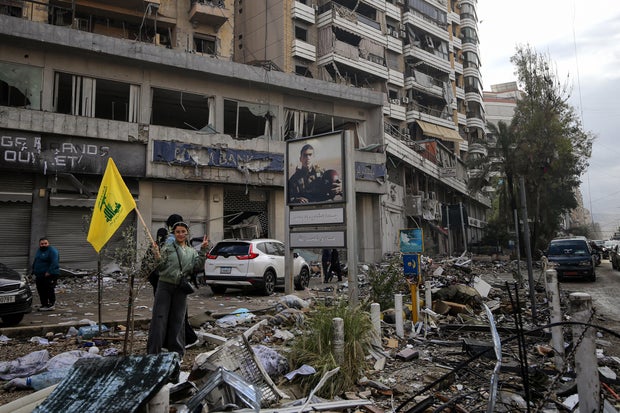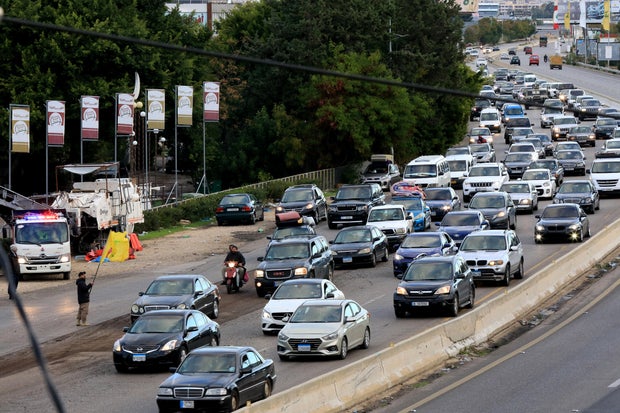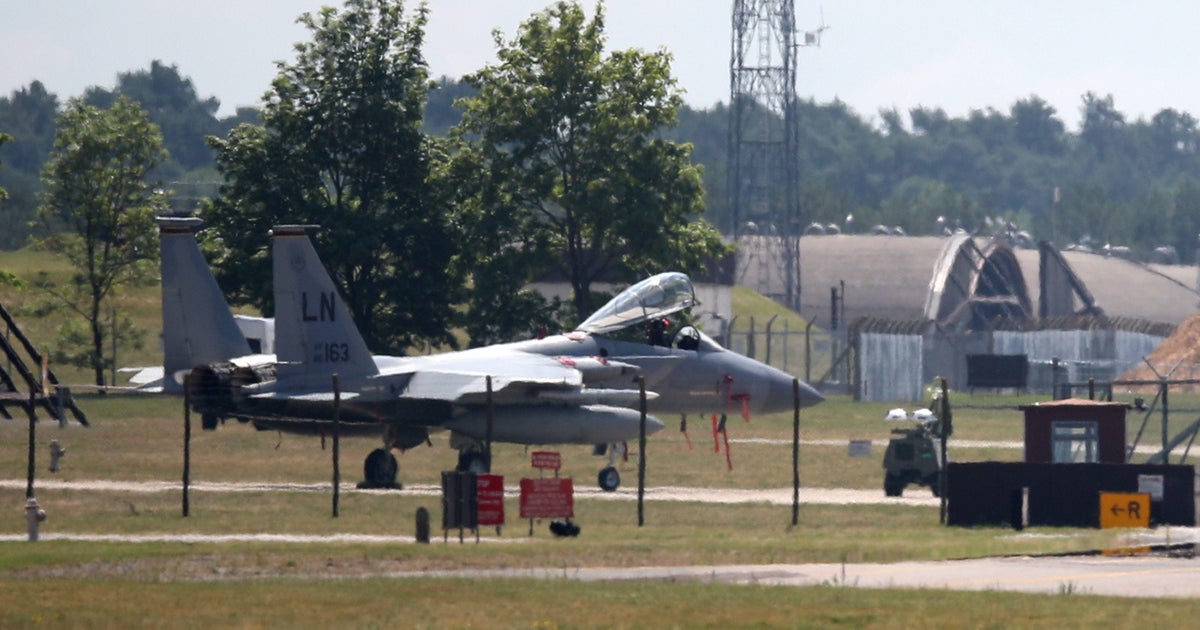As Israel-Hezbollah ceasefire takes hold, Biden heralds new push for truce with Hamas in Gaza
As a ceasefire the U.S. helped broker between Israel and the Iran-backed group Hezbollah came into effect Wednesday, President Biden said his administration would quickly launch "another push" with international partners to secure a deal to end the even deadlier war in the Gaza Strip.
Mr. Biden, who has less than two months left in office, said in a social media post Wednesday morning that his administration would work in the coming days with Israel and other partners in the region to "achieve a ceasefire in Gaza with the [Israeli] hostages released and an end to the war without Hamas in power."
The ceasefire the U.S. and France helped secure to stop the fighting between the Lebanese militant group Hezbollah and Israel appeared to be largely holding Wednesday hours after it took effect. There was, however, an unverified claim from the head of Lebanon's national journalists syndicate that Israeli forces in or near the southern city of Khiam had opened fire "at a group of journalists and correspondents" there, allegedly leaving two — one with The Associated Press and one with the Russian agency Sputnik — with unspecified injuries.
Lebanon's state-run National News Agency cited the head of the syndicate, Joseph Al-Qasifi, as calling it "the first violation of the ceasefire."
A spokesperson for The Associated Press told CBS News the agency was "grateful our freelancer is OK," suggesting any injuries sustained were minor, but adding: "Journalists must be able to safely operate in Lebanon as they cover this conflict."
The Israel Defense Forces did not immediately reply to CBS News' request for comment on the incident, but the IDF said in a brief statement that troops had questioned four "suspects [who] approached IDF soldiers stationed in southern Lebanon" Wednesday. There were no further details, and it was unclear whether that incident was related to the alleged shooting in Khiam.
The war in Lebanon simmered for months after Hezbollah started launching rockets at northern Israel in support of its ideological allies Hamas, the day after Hamas carried out its Oct. 7, 2023, terrorist attack in Israel, sparking the war in Gaza. That attack saw Hamas and allied militants kill some 1,200 people in Israel and take 250 others hostage.
The near-constant volley of rockets and missiles across the Israel-Lebanon border escalated dramatically in September, and Lebanese officials said about 3,800 people had been killed by the time the truce took effect Wednesday morning. Israeli authorities say Hezbollah's rocket strikes have killed 45 civilians over the past year, and at least 73 Israeli soldiers have been killed amid the operations in southern Lebanon.
But the agreement between Israel and Hezbollah did not address the war in Gaza, which sits at the heart of the tension in the Middle East. Health officials in the decimated, Hamas-ruled Palestinian territory say Israel's military assault in Gaza has killed more than 44,280 people and left some 104,000 others wounded. Most of the enclave's 2.3 million people have been displaced from their homes, many of them forced to flee multiple times over the last year.
"Just as the Lebanese people deserve a future of security and prosperity, so do the people of Gaza. They too deserve an end of the fighting and displacement," Mr. Biden said Tuesday at the White House. "The people of Gaza have been through hell."
Hamas indicated its openness to renewed negotiations for a Gaza ceasefire on Wednesday, with a senior official from the group telling the French news agency AFP that it had "informed mediators in Egypt, Qatar and Turkey that Hamas is ready for a ceasefire agreement and a serious deal to exchange prisoners."
The Reuters news agency quoted Hamas official Sami Abu Zuhri as saying the group recognized Lebanon's right to take part in the ceasefire with Israel, to protect its population, and voicing hope that an agreement to end the Gaza war might also be possible after many months of largely fruitless talks.
Mr. Biden said the U.S. would work with "Turkey, Egypt, Qatar, Israel, and others" to broker a so-far elusive deal between Israel and Hamas, and the Egyptian government announced Wednesday that President Abdel Fattah El-Sisi had already met with the visiting Qatari prime minister to review "joint efforts aimed at a ceasefire in Gaza, joint efforts to secure the release of the hostages and the unconditional access of humanitarian and relief aid to the Gaza Strip."
Earlier Wednesday, King Abdullah II of Jordan also visited Cairo and met with el-Sisi, discussing both the ceasefire in Lebanon and the latest developments in Gaza, according to Egyptian officials.
But while the negotiators renew their efforts on Gaza, they'll likely be keeping a very close, even wary eye on Israel's northern border with Lebanon, as there's far more international will behind the ceasefire with Hezbollah than there is trust between the longtime foes.
Israel and Hezbollah were exchanging heavy fire right up until the moments before the ceasefire came into effect Wednesday. It will now be a tense wait to see if the peace holds during the 60-day period when Israeli forces, who crossed the border in early October, slowly pull out of Hezbollah's previous stronghold in southern Lebanon. They are to be replaced by Lebanese soldiers and United Nations peacekeepers during a process monitored by the U.S. and France.
Over the coming two months, Israel must withdraw all its troops from Lebanon and Hezbollah must pull its fighters and weapons back about 20 miles north of the border, to the other side of the Litani River.
But the distrust on both sides of the border – the so-called Blue Line established after the last Israel-Hezbollah war in 2006 – runs deep. Both Mr. Biden and Israeli Prime Minister Benjamin Netanyahu stressed Tuesday that, in the Israeli leader's words: "If Hezbollah breaks the agreement and tries to rearm, we will attack."
"For every violation," Netanyahu threatened, "we will attack with might."
Speaking Wednesday on "CBS Mornings" U.S. National Security adviser Jake Sullivan said the Biden administration helped broker the truce based on previous successes, and failures.
"We have learned from the past," he said, "and we have designed this deal to be long-standing and to stay in effect - to continue to sustain the peace and also to ensure the security of the State of Israel."
The fighting between Israel and Hezbollah drove hundreds of thousands of Lebanese civilians from their homes in the south, and about 60,000 Israelis from their communities near the border in the north.
"It's not safe to go home," Israeli Eliyahu Maman said as the truce silenced the rocket-fire, "because Hezbollah can still harm us."
On the other side of the border, Beirut resident Rima Abdkhaluk said she didn't "believe in this ceasefire… Israel cannot be trusted."
But neither the lack of trust nor warnings from Israeli and Lebanese officials for civilians not to return to areas evacuated amid Israel's offensive since October were enough to deter thousands of Lebanese civilians from packing their belongings back into cars and cramming onto highways to try to return to their homes in the south on Wednesday.
Some 2 million Palestinians in Gaza will be hoping that they, too, might get the chance to start rebuilding their shattered lives in the coming weeks. The families of about 100 Israeli hostages still held in the Gaza Strip will be hoping the renewed push for a ceasefire with Hamas can also bring their loved ones back home.





